HRH Prince Charles and Sir Jony Ive on designing for a better world
Founded and led by His Royal Highness The Prince of Wales (as he was at the time of publication) and Sir Jony Ive – who headline the August 2022 issue of Wallpaper* – the Terra Carta Design Lab celebrates young designers developing high-impact, low-cost solutions to the climate crisis. Ive speaks exclusively to Deyan Sudjic, Wallpaper* contributing editor and director emeritus of the Design Museum, London
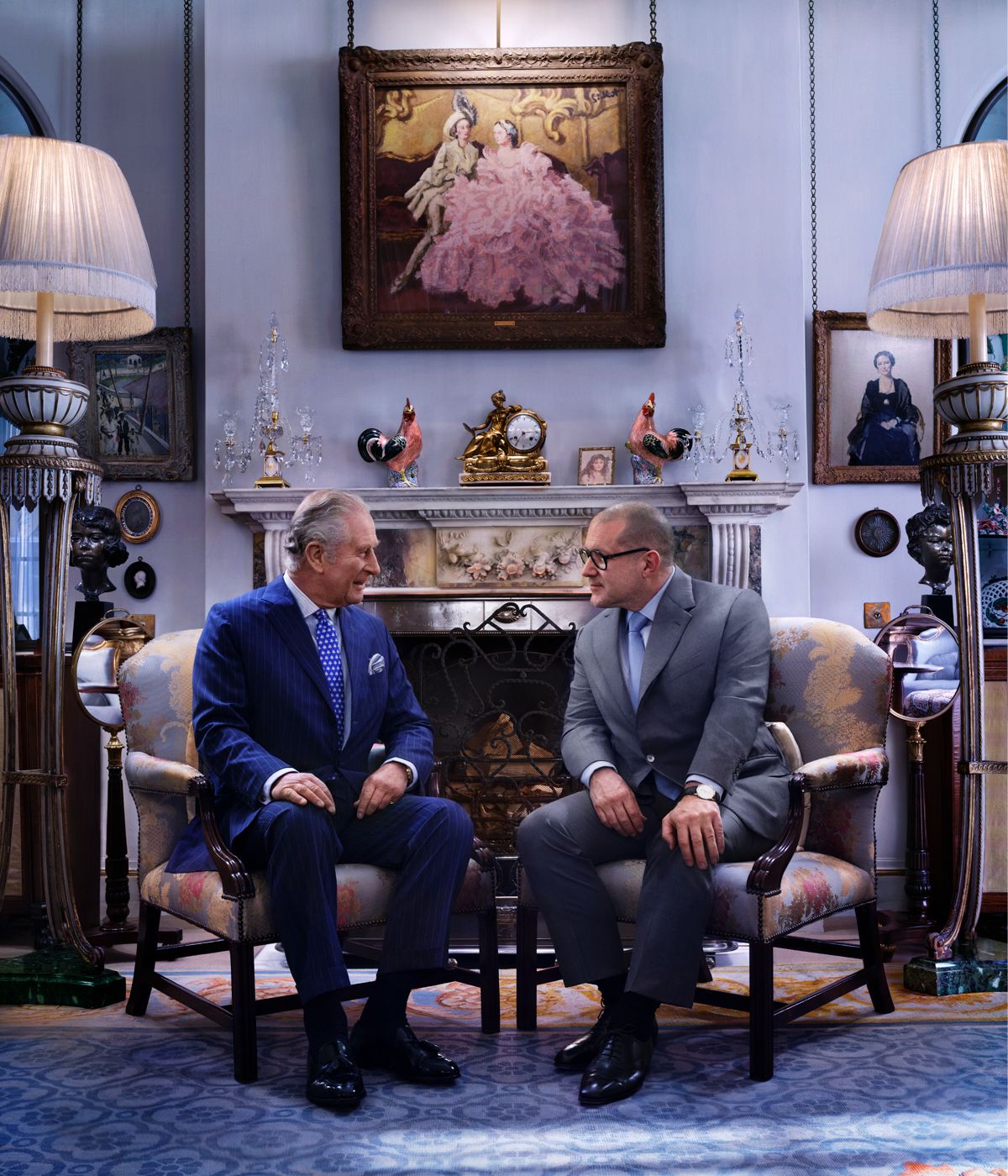
Sir Jony Ive signs off the website of his creative collective, LoveFrom, with two startling, contradictory words: ‘Love’ and ‘Fury’, connecting them with a meticulously drawn ampersand. They suggest a more complicated and surprising designer than the purist who gave the enigmatic first-generation iPhone its Dieter Rams-inspired calculator interface.
Ive is unfailingly polite, solicitous and considerate in conversation, and yet every so often he uses the word ‘fury’ or ‘furious’, or ‘angry’. It makes him sound a bit like William Morris, who gave up design to campaign for socialism, complaining within the hearing of his clients of spending his life ‘ministering to the swinish luxury of the rich’. Ive certainly isn’t giving up design, but he suggests that, when discussing work in his studio, he is sometimes arguing with himself: ‘mostly it is an internal monologue’. He belongs to a generation of designers who grew up reading Victor Papanek’s Design for the Real World, which made the notorious claim that ‘there are professions more dangerous than industrial design, but not many.’
His career to date has been inextricably associated with the giant company that has done more than most to define modern industrial production, and perhaps even modern life. Though he stepped down from the chief design officer role in 2019, he continued to work with Apple until this year. His current clients include Ferrari and Airbnb.
Terra Carta: a new charter for the planet
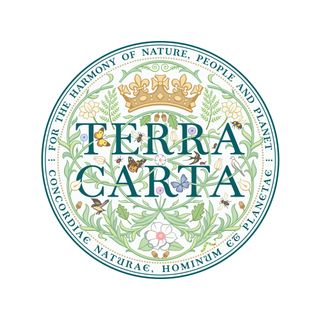
The Terra Carta Seal by LoveFrom
Alongside his work for industry behemoths, Ive recently designed a seal for the Prince of Wales’ Terra Carta campaign, with the words ‘For Nature, People and Planet’ around the edge rendered in the specially drawn serif font, derived from the work of the 18th-century printer John Baskerville, that Ive reserves for his personal projects. The seal has an elegance and emotional punch that somehow hints at the sensibility of both William Blake and Damien Hirst.
Terra Carta, named in a conscious echo of the 13th-century Magna Carta, is a document designed to guide business in averting climate catastrophe. Magna Carta, which promised trial by jury and the abolition of cruel and unusual punishment, was written with considerable elegance by the Archbishop of Canterbury of the time. The new Terra Carta, which aims to show that capitalism and enlightened self-interest are compatible with saving the planet, may have a Latin name, but its vocabulary is unsurprisingly accented by the language of modern management theory. With its frequent references to ‘road maps’, ‘value chains’ and ‘game changers’, Terra Carta aims to identify 13 fruitful areas for investment, including biomimicry, electric flight propulsion, carbon-neutral construction, nuclear fission, and green infrastructure.
It’s an approach that has drawn the attention of Greenwash.Earth, an Extinction Rebellion-backing activist group that calls out organisations that ‘claim to care about the natural world while knowingly destroying it’. They call Terra Carta ‘a great idea’ and say ‘we don’t think Terra Carta is greenwashing’. But they have expressed scepticism about some of the 450 organisations, which include HSBC and BP, that have signed up to support the document.
As chancellor of the Royal College of Art (RCA), Ive does not confine himself to dressing in a colourful cod-medieval outfit once a year to officiate at the degree ceremony. He has worked with the Prince to kick-start what he calls a design lab at the college, to support the aims of Terra Carta, and perhaps to prove Papanek was wrong, even if he shares some of the latter’s concerns.
Wallpaper* Newsletter
Receive our daily digest of inspiration, escapism and design stories from around the world direct to your inbox.
Terra Carta Design Lab: the four winners
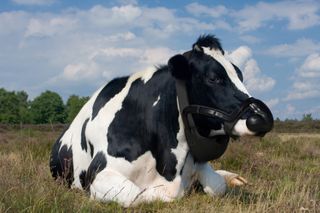
Terra Carta Design Lab winner: the Zero Emissions Livestock Project (Zelp) has designed a wearable device for cattle to neutralise methane emissions and improve animal welfare
The Prince and Ive were at the college at the end of April to announce which four projects, chosen from 125 submissions made by RCA students and recent alumni, would share £200,000 from the Prince’s Sustainable Markets Initiative, and benefit from time with Ive and other advisors to find ways to use that money to take their ideas to market.
The successful entrants range from a group of designers working on methods of dealing with the microplastic pollutant released from vehicle tyres, which, it turns out, is almost as damaging as single-use plastic, to a muffler device that can convert methane emissions from cows into comparatively less threatening CO2, as well as a waterproof textile that does not bleed harmful chemicals into the water table, and an idea for low-tech aerofoil-assisted reseeding projects for degraded natural environments. The four, plus two runners-up, have been chosen for their ability to make a visible difference, and how close they are to being realised. For example, the Zelp methane capture project set up by Francisco Norris, an RCA graduate from 2017, has already secured substantial investment and has 26 employees.
‘The design lab idea came from a conversation between Jony and the Prince,’ says RCA vice chancellor Paul Thompson. ‘It’s had a powerful impact on the whole RCA, bringing everybody together.’
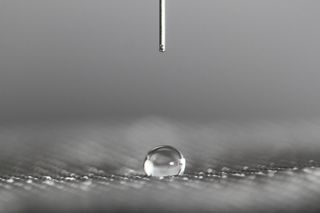
Terra Carta Design Lab winner: the first totally recyclable outdoor performance textile, Amphitex by Amphibio will be made from recycled and plant-based feedstock
As Charles shook hands with the winners, he told his audience how proud he was to be associated with such remarkable ideas. He spoke of ‘the urgency of the crisis that confronts us in all directions,’ and of the need to find solutions rapidly, ‘through the combination of art, science and technology, that together have a better chance of winning this battle.’
Prince Charles and Jony Ive: a meeting of minds
Ive first met Charles more than a decade ago when he and Steve Jobs went to Highgrove, the Prince’s private residence in Gloucestershire. He admires the Prince’s command of the issues confronting us on climate change, and even more the way in which he addresses them. ‘It’s easy to say the threat is too profound and too existential to do anything but retreat. With the certainty of knowledge that comes from looking at the issues for a long time, the Prince has described the problem, but his engagement does not come from fear.’
Ive confesses that he is an anxious person. As the reference to Love and Fury on LoveFrom’s website suggests, his strategy for dealing with that anxiety is to convert fear into fury. ‘Fear seems passive. I am more angry than I am fearful,’ he says. ‘It’s dangerous when you feel powerless in the face of a challenge. The thing about fear is that it is passive, corrosive and deeply unhealthy. It encourages you to retreat, because you don’t think you can effect change.’
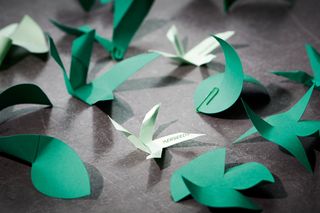
Terra Carta Design Lab winner: Bike Ayaskan and Begum Ayaskan’s Aerseeds are pods that are designed to be carried by the wind to deliver nutrients and seeds to regenerate soils
When Ive talks about design, his language is fiercely moralistic. ‘I am angry that most of what is made seems so thoughtless. So many products do not deserve to exist. The minimum that they should do to justify themselves and consume all that material is that their designers should care about them.’
Ive is heartened both by the young designers whose work is the basis of the Terra Carta project, and by their ideas. He sees their work as ‘a wonderful antidote to dodging and retreating’. He is equally impressed by how articulate they are. ‘I used to struggle to speak, and to have heard every one of them talk with passion and knowledge, with fire in their bellies, but with no arrogance, was tremendously encouraging.’
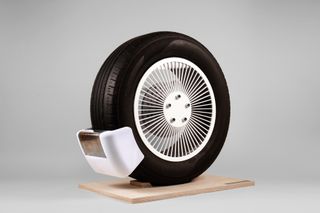
Terra Carta Design Lab winner: the Tyre Collective’s device attaches to a wheel to capture the unseen synthetic rubber particles expelled by tyre wear, a major source of pollution
Ive is an optimist about what designers have to offer. As he sees it, design is still in flux. ‘We have lost sight of how recent industrialisation is. Unlike architecture, design is still a new profession. It developed by putting a design office on top of a manufacturing plant, then discovered authorship, and is still trying to find how to make sense of the equation.
'To have heard every one of these young designers talk with passion and knowledge, with fire in their bellies, was tremendously encouraging'
- Jony Ive
‘I am struck by the conspicuous lack of a completely identifiable movement,’ continues Ive. ‘Perhaps the last one was Ettore Sottsass and Memphis. Perhaps because it’s easier to identify a movement that can be summarised by appearance.’
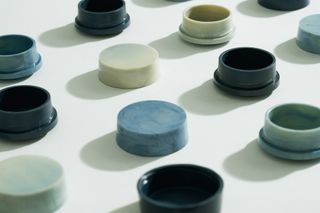
Terra Carta Design Lab runner-up: Shellworks uses bacteria to produce sustainable packaging for the beauty and personal care industry that is truly compostable, cost-competitive, aesthetic and effective
If Ive has his way, the future of design is to combine the care of makers with the potential of contemporary industrial manufacturing. ‘In the 1980s, when manufacturing started to be outsourced from North America, it was not because of the rate for labour, it was because of skills that could not be found in other places. The narrative is that it was cheaper. That was not the case, it was to find capability. When you design, you must have a thorough understanding of materials, otherwise you get a fractured development of form. You often hear people apologising that things are not made the way that they wanted. I understand that excuse, but at Apple, I spent months at manufacturing sites, and my apology would have had no currency.
‘Makers never say, “it’s not been made quite the way that I wanted”. If it’s designed and made with care, a mass-produced object can have the resonances of a batch production. It comes down to motivation and the sacrifices you make for the exercise.’
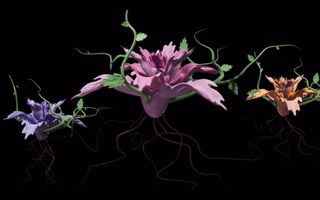
Terra Carta Design Lab runner-up: Or:Bital Bloom is a data-driven artwork that ‘blooms’ in response to corporate and organisational adherence to sustainability targets and carbon emission reductions
For Ive, design is about care, something that he once discussed with Jobs. It was a conversation from which his other sign-off word came. ‘He told me, “When you make something with care, even though you don’t know who the people using it will be, they will sense it. Care is a way to express our love for the species”.
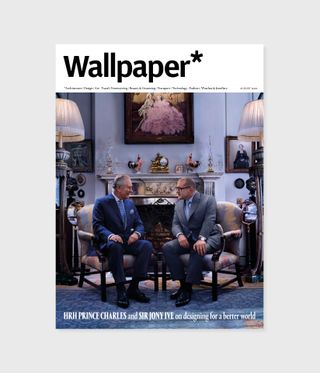
The Wallpaper* August 2022 issue newsstand cover, featuring Prince Charles and Jony Ive, photographed in the Morning Room at Clarence House in St James’s, London, by Nick Knight
INFORMATION
The August 2022 Design for a Better World issue of Wallpaper* is available from 14 July in print, on the Wallpaper* app on Apple iOS, and to subscribers of Apple News +. Subscribe to Wallpaper* today
-
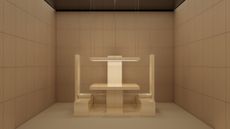 Emerging galleries to discover during Milan Design Week
Emerging galleries to discover during Milan Design WeekWallpaper’s Milan editor has the inside track on the younger design galleries coming to town
By Laura May Todd Published
-
 Exploring this whimsical North London home feels like going down the rabbit hole
Exploring this whimsical North London home feels like going down the rabbit holeWallpaper* series, The Inside Story, spotlights intriguing, exciting or innovative interiors. OntheSq is the result of a renovation of a beautiful period property, which has been dressed in a mélange of designs loosely inspired by 'Alice in Wonderland'
By Anna Solomon Published
-
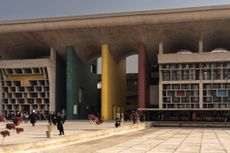 This ‘architourism’ trip explores India’s architectural history, from Mughal to modernism
This ‘architourism’ trip explores India’s architectural history, from Mughal to modernismArchitourian is offering travellers a seven-night exploration of northern India’s architectural marvels, including Chandigarh, the city designed by Le Corbusier
By Anna Solomon Published
-
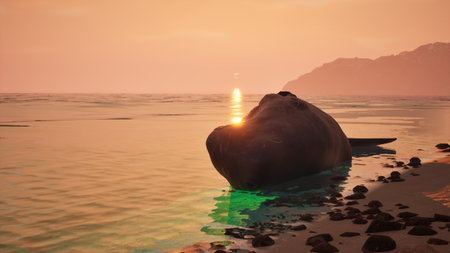 Designed to change the world: 2024 Terra Carta Design Lab finalists announced
Designed to change the world: 2024 Terra Carta Design Lab finalists announcedAnnounced on 26 June, the 2024 Terra Carta Design Lab finalists from the RCA demonstrate design's 'potential to change how we live and care for the world in the future'
By Rosa Bertoli Published
-
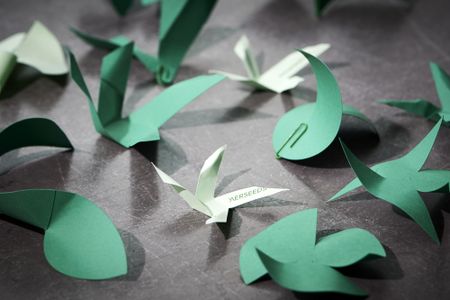 Terra Carta Design Lab announces second edition
Terra Carta Design Lab announces second editionFor the Terra Carta Design Lab’s second edition, students and recent alumni are invited to design high-impact, low-cost solutions to address the climate crisis
By Rosa Bertoli Published
-
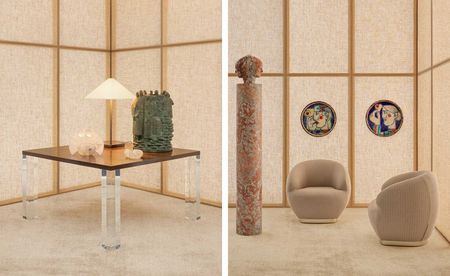 Art, artefacts and Armani Casa: step into our Made in Italy showcase
Art, artefacts and Armani Casa: step into our Made in Italy showcaseIn this photographic series, we combine Armani Casa’s timeless furniture collections with Italian art and rare artefacts to tell the story of Made in Italy craftsmanship
By Nick Vinson Published
-
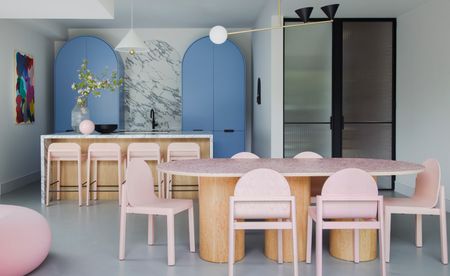 Playful design codes rule in this London Victorian family home
Playful design codes rule in this London Victorian family home2LG Studio embraces colour and comfort in an extensive renovation of a Victorian family home
By Hannah Silver Published
-
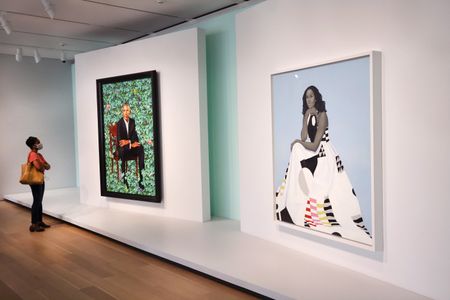 Design at the White House: the creatives working with US Presidents past and present
Design at the White House: the creatives working with US Presidents past and presentInterior designers, fashion designers and artists, whose collaborators have included the White House and its residents, with commissions that range from interior refits to presidential portraits
By Pei-Ru Keh Published
-
 Essx store opens in New York’s Lower East Side
Essx store opens in New York’s Lower East SideEssx is a new concept and community store by local architecture firm Leong Leong and designer Yossi Shetrit
By Pei-Ru Keh Published
-
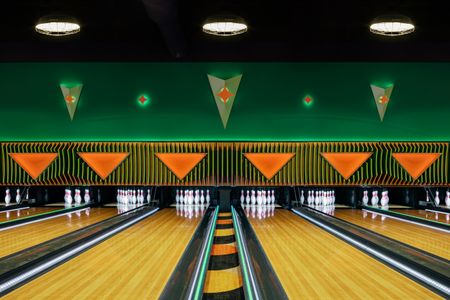 Eastside Bowl scores big with a maximalist postmodern aesthetic
Eastside Bowl scores big with a maximalist postmodern aestheticDesigned by Cowboy Creative, Eastside Bowl in Nashville, Tennessee, combines American nostalgia and southern charm
By Pei-Ru Keh Published
-
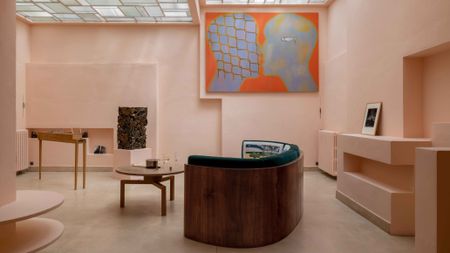 The Design Parade kicks off a creative Summer in the French Mediterranean
The Design Parade kicks off a creative Summer in the French MediterraneanDesign Parade 2023, set between Hyères and Toulon until the fall, features a showcase of design by emerging and established talent
By Jean Grogan Last updated